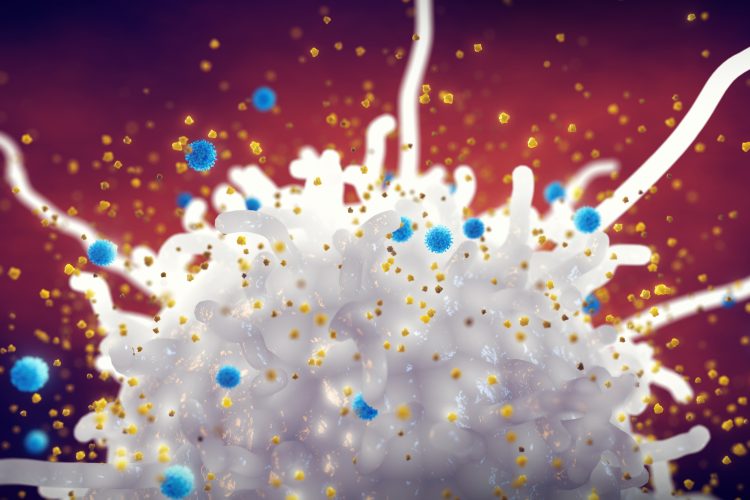POLB 001: tackling cytokine storms before they start
Posted: 23 May 2025 | Dr Liam Tremble (Principal Scientist at Poolbeg Pharma) | No comments yet
Cytokine release syndrome (CRS) is a major barrier in cancer immunotherapy – but what if we could prevent it before it begins? Dr Liam Tremble, Principal Scientist at Poolbeg Pharma, discusses how POLB 001, an oral anti-inflammatory candidate, could offer a new way forward.


In the ever-evolving landscape of immuno-oncology, managing the side effects of advanced therapies has become just as important as enhancing their efficacy. Among the most concerning complications is cytokine release syndrome (CRS), a potentially life-threatening condition that frequently follows the administration of some CAR T-cell therapies and bispecific antibodies. As the biotech sector races to improve the tolerability of these revolutionary treatments, Poolbeg Pharma has a novel solution: an oral therapy, POLB 001, to block the development of CRS, by limiting inflammation without affecting the anti-cancer immune responses that are vital for effective immunotherapies.
At the forefront of this development is Dr Liam Tremble, Principal Scientist at Poolbeg Pharma, whose background as an immunologist and cancer researcher gives him a unique perspective on this promising drug. In this article, Tremble sheds light on the distinct features of POLB 001, its potential impact on access to care, and how it may redefine the future of supportive oncology medicine.
It takes a family to develop a drug
Tremble’s role at Poolbeg is multifaceted, reflecting the collaborative ethos of the company’s scientific team. “I take responsibility for identifying pre-clinical research that can support our clinical programs, as well as designing and overseeing its execution,” he explains. “It takes a family to develop a drug and identify the opportunities and pitfalls. Our goals are to progress our pipeline and position each asset for clinical and commercial success.”
Biomarkers aren’t just supporting drug discovery – they’re driving it
FREE market report
From smarter trials to faster insights, this report unpacks the science, strategy and real-world impact behind the next generation of precision therapies.
What you’ll unlock:
- How biomarkers are guiding dose selection and early efficacy decisions in complex trials
- Why multi-omics, liquid biopsy and digital tools are redefining the discovery process
- What makes lab data regulatory-ready and why alignment matters from day one
Explore how biomarkers are shaping early drug development
Access the full report – it’s free!
It takes a family to develop a drug and identify the opportunities and pitfalls. Our goals are to progress our pipeline and position each asset for clinical and commercial success.
The tight-knit structure of the Poolbeg team allows Tremble to contribute not only to early-stage drug development but also to clinical trial design, patient stratification, and biomarker strategy. “Being a part of a small team provides an excellent opportunity to collaborate with team members who have diverse skill sets,” he notes, “which creates opportunities for further learning and up-skilling.”
That spirit of learning is fuelling the development of POLB 001, an investigational compound that could transform how CRS is managed – and potentially prevented – in patients undergoing immunotherapy.
Targeting inflammation at its core
CRS, though common, remains difficult to treat effectively. Existing therapies, such as tocilizumab, work by blocking specific inflammatory pathways but often come with limitations.
“POLB 001 has a number of features which can potentially address the significant issue of CRS in the clinic,” Tremble says. “It is an oral therapy and has an excellent tolerability profile, this makes it suitable for patients to take in many settings, including at home. Its safety profile is key because these patients often have a lot of comorbidities.”
POLB 001 has a number of features which can potentially address the significant issue of CRS in the clinic.
Beyond its convenience and safety, POLB 001’s mechanism of action distinguishes it from current standards. It targets the p38 MAP kinase pathway, a key signalling pathway in the body that helps regulate inflammation and the immune response. This enables it to inhibit a broad spectrum of inflammatory cytokines rather than just one or two, as with tocilizumab or IL-1 receptor antagonists.
“It inhibits a wide range of inflammatory mediators… its differentiated mechanism of action provides the potential for it to provide superior protection, particularly against more severe CRS, which current treatments are only partially effective against.” This broader inhibition could allow clinicians to prevent CRS prophylactically, rather than simply reacting once symptoms appear. “Even for patients who don’t experience CRS, the current medical monitoring of patients utilises extensive resources and potentially limits access to life saving therapies,” Tremble points out.
A balancing act in immuno-oncology
The challenge in CRS management is always the same: suppress the dangerous inflammation without compromising the body’s immune response to cancer. Tremble highlights the delicate balance that POLB 001 aims to strike.
The ability to prevent elevation of cytokines is key but doing it in a way which does not impair anti-cancer T cell responses is so important.
“The ability to prevent elevation of cytokines is key but doing it in a way which does not impair anti-cancer T cell responses is so important,” he stresses. “Many patients experiencing CRS have just received an immunotherapy for late-stage cancers with little or no other options with proven effectiveness to fall back on.”
Fortunately, existing scientific literature provides hope that POLB 001 may hit the mark. “p38 has been investigated for its ability to fuel inflammation for several decades, and if interpreted correctly we can see that inhibiting p38 is one of a small number of methods which can do just that!”
By preserving the cancer-fighting capabilities of the immune system while preventing the harmful cascade of cytokines, POLB 001 has the potential to become a foundational support therapy in cancer immunotherapy regimens.
Expanding access through prophylaxis
The case for a prophylactic approach to CRS is not just scientific – it’s humanitarian and economic. According to Tremble, over 70 percent of cancer patients receiving certain CAR T or bispecific therapies will experience CRS. Many are already fragile, with impaired immune systems and limited treatment options.
“CRS is a potentially life-threatening condition – reducing or eliminating these comorbidities is crucial for patients,” says Tremble. “Eliminating CRS will potentially have numerous benefits to patients and empower healthcare providers to treat a larger number of individuals.” One of the most promising implications of POLB 001 lies in its potential to enable outpatient cancer immunotherapy. Currently, treatments involving bispecific antibodies require patients to remain in the hospital for extended periods to monitor for side effects, especially CRS.
“At the moment many treatments are required to be dosed in specialist cancer centres equipped with intensive care facilities,” Tremble explains. “Being able to prevent CRS may allow many patients to receive this treatment in an outpatient setting.”
Eliminating CRS will potentially have numerous benefits to patients and empower healthcare providers to treat a larger number of individuals.
The knock-on effects could be profound: fewer occupied hospital beds, reduced strain on specialist centres, lower treatment costs, and increased access to cutting-edge therapies for patients who might otherwise be excluded due to logistical or systemic barriers.
When asked about POLB 001’s safety profile, he said, “Clinical development is an incremental process. We investigate every potential signal and at every stage of development. We have a focus on the overall risk-benefit profile of a drug.”
Yet the early signs are highly promising: “At this stage, we are highly enthused by POLB 001’s profile, including its excellent safety record from two phase I clinical trials.”
This strong safety foundation, coupled with the therapy’s oral administration and broad anti-inflammatory action, creates a compelling case for its continued development – not only in CRS prevention but potentially in other inflammatory or immune-related conditions.
Looking ahead
As Poolbeg Pharma advances POLB 001 through clinical development, its success could usher in a new paradigm for supportive care in oncology – one in which prevention of treatment-related complications becomes just as targeted and strategic as the therapies themselves.
In Tremble’s view, that’s not just a scientific milestone, but a necessary step toward more equitable and effective care: “A lot of the infrastructure requirements fall away if CRS can be prevented,” he notes. “Outpatient treatment may also facilitate treatment at a wider number of healthcare settings, reducing the distance that patients need to travel.”
As the world of oncology continues to evolve, innovations like POLB 001 show that supportive therapies – those designed to reduce risks and improve access – can be just as transformative as the drugs they accompany.


Liam Tremble is the lead on a number of Poolbeg Pharma’s early-stage discovery programs. Liam was one of Poolbeg’s first employees, having previously worked for the CRO, hVIVO, conducting human challenge trials. Liam has become the Project Lead for Influenza and RSV drug discovery AI programs, Scientific Advisor on drug candidate licencing opportunities, Project Lead on non-dilutive funding opportunities and grant writing and Scientific Lead on product repositioning and indication expansion. Liam has a particular interest in immunomodulatory therapies for the prophylaxis and treatment of infectious diseases and cancer. Identifying new opportunities to improve patient outcomes and bring new products to the clinic drives him in his day-to-day work at Poolbeg Pharma plc. Liam has a PhD in Translational Cancer Research from University College Cork, having previously being trained as an Immunologist at Trinity College Dublin (BSc and MSc).
Related topics
Cell Therapy, Cytokines, Immuno-oncology, Immuno-oncology therapeutics, Immunotherapy
Related conditions
Cancer, Cytokine-release syndrome (CRS)
Related organisations
Poolbeg Pharma
Related people
Dr Liam Tremble (Principal Scientist at Poolbeg Pharma)







